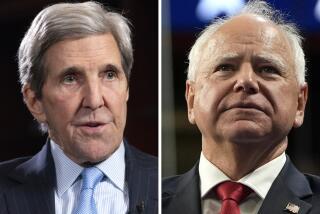Kerry Keys In on Bush’s Iraq Record
- Share via
JACKSONVILLE, Fla. — Sen. John F. Kerry pressed his case Tuesday that President Bush was “in denial” about instability in Iraq, continuing his bid to shift the debate over the conflict from questions about his own positions to administration policies.
During a 30-minute news conference in Jacksonville, where he later conducted a town hall meeting on healthcare, the Democratic presidential candidate was quizzed repeatedly about his often convoluted statements about the war. In every answer, Kerry sought to put the focus back on Bush’s leadership.
“The president wants to shift the topic, and I’m not going to let him shift the topic,” Kerry told reporters. “This is about President Bush and his decisions and his choices and his unwillingness ... to live in a world of reality, and American lives are on the line as a consequence of that.”
Kerry’s persistence in putting the onus on his rival to address the ongoing unrest in Iraq came a day after he delivered his most sweeping indictment of Bush’s handling of the war and its aftermath.
His advisors moved quickly to keep the story alive, making Kerry available Tuesday for his first news conference since early August. Kerry used the occasion to critique Bush’s United Nations address on Iraq earlier in the day, calling it ineffective, and fielded a barrage of questions about his stance on the war.
The Massachusetts senator repeatedly dismissed the notion that, given his support for a congressional resolution in October 2002 authorizing the use of force against Iraqi dictator Saddam Hussein, he had since made conflicting statements on the issue.
“I have one position on Iraq -- one position,” he said.
Focusing on the rationale the administration initially provided for invading the country, Kerry scoffed at Bush’s more recent statements, saying the president “actually says to Americans, if there were no imminent threat, no weapons of mass destruction, no connection to Al Qaeda ... he would still have taken America to war.”
Aides made it clear that the campaign aimed to put Bush on the defensive over Iraq and shift attention from some of Kerry’s previous comments on the topic.
“Have we turned to the point where we can turn fully and engage in that debate [about Bush’s policies]? We sure hope so,” spokesman Mike McCurry said.
The Bush campaign rejected the assertion that Kerry had gained the upper hand on the Iraq issue, saying his latest comments merely caught him in more contradictions and undercut U.S. interests.
“John Kerry’s shifting positions, his contradictions, his pessimism and his hopeless rhetoric send the wrong message to our troops, to our allies, to our enemies and to the world,” Bush spokesman Steve Schmidt said.
But Democratic activists who had been fretting that Kerry had not effectively delineated his differences with Bush on Iraq expressed delight with his new rhetoric.
“It’s kind of nice to see the guy that won the [Iowa] caucuses back on the campaign trail,” said David Nagle, former Iowa Democratic Party chairman. “We kind of wondered what happened to the John Kerry that left Iowa in January.... He should have done it a helluva lot sooner.”
Still, the relief among some party leaders was tinged with worry about whether Kerry would be able to sustain his focus for the next 41 days.
“The problem all along for Kerry has been discipline, message discipline,” said Donna Brazile, who managed Democrat Al Gore’s 2000 presidential bid. “Today he looked disciplined. It was like, wow, did someone give him a memo he finally understood, or what?”
The question, she added, “is can he keep this going?”
Indeed, even as Kerry has sharpened his criticisms of Bush’s handling of Iraq this week, signs remained of his difficulties in discussing the matter.
During an appearance Monday on “Late Night With David Letterman,” Kerry responded with a simple “No” when asked by the talk show host whether he would have taken the U.S. to war under the circumstances Bush faced.
But he then acknowledged that the Bush administration, like Congress, had intelligence indicating Iraq possessed weapons of mass destruction.
“We believed there were weapons,” Kerry said, going on to criticize Bush’s handling of the war but not the decision to invade.
In Jacksonville on Tuesday, Kerry appeared to offer competing explanations as to why he voted against a resolution authorizing the use of force against Hussein in 1991, after Iraq had invaded Kuwait, but for the 2002 resolution.
The Democrat said of his vote two years ago: “It wasn’t a vote to go [to war] that day. It was a vote to go through the process of going to the U.N., building the allies, then making the judgment of whether we had to go.”
Minutes later, he was asked why he had opposed the 1991 resolution that gave President George H.W. Bush authority to use force against Hussein.
“I thought we needed a little more time to be able to work through the diplomacy so that you’ve exhausted those remedies,” he said.
“That’s not the debate,” Kerry added quickly. “The debate now is whether or not you have a plan to win, and whether or not you are facing the realities on the ground in Iraq.”
Kerry did not directly answer a question about whether he agreed with U.N. Secretary-General Kofi Annan’s assessment that the U.S.-led war in Iraq was “illegal,” but he said the statement underscored the administration’s failure to build international support for its Iraq policies.
“We’re at war,” he said. “Our troops are dying, people are being beheaded, and we’ve got countries that our president doesn’t bother to talk to to say, ‘We’ve got to have your help.’ ”
Later, Kerry touted his healthcare plan before hundreds of supporters at the Jacksonville convention center. His campaign also unveiled a television ad accusing Bush of allowing healthcare costs to skyrocket.
At a rally in Orlando on Tuesday night, Kerry and his running mate, Sen. John Edwards, were greeted at an indoor stadium by a crowd estimated at 11,000.
Kerry, his voice cracking as he battled a cold, provoked thunderous applause when he said, “I think it’s time that we relieve George Bush of his responsibilities.”
More to Read
Get the L.A. Times Politics newsletter
Deeply reported insights into legislation, politics and policy from Sacramento, Washington and beyond. In your inbox twice per week.
You may occasionally receive promotional content from the Los Angeles Times.










